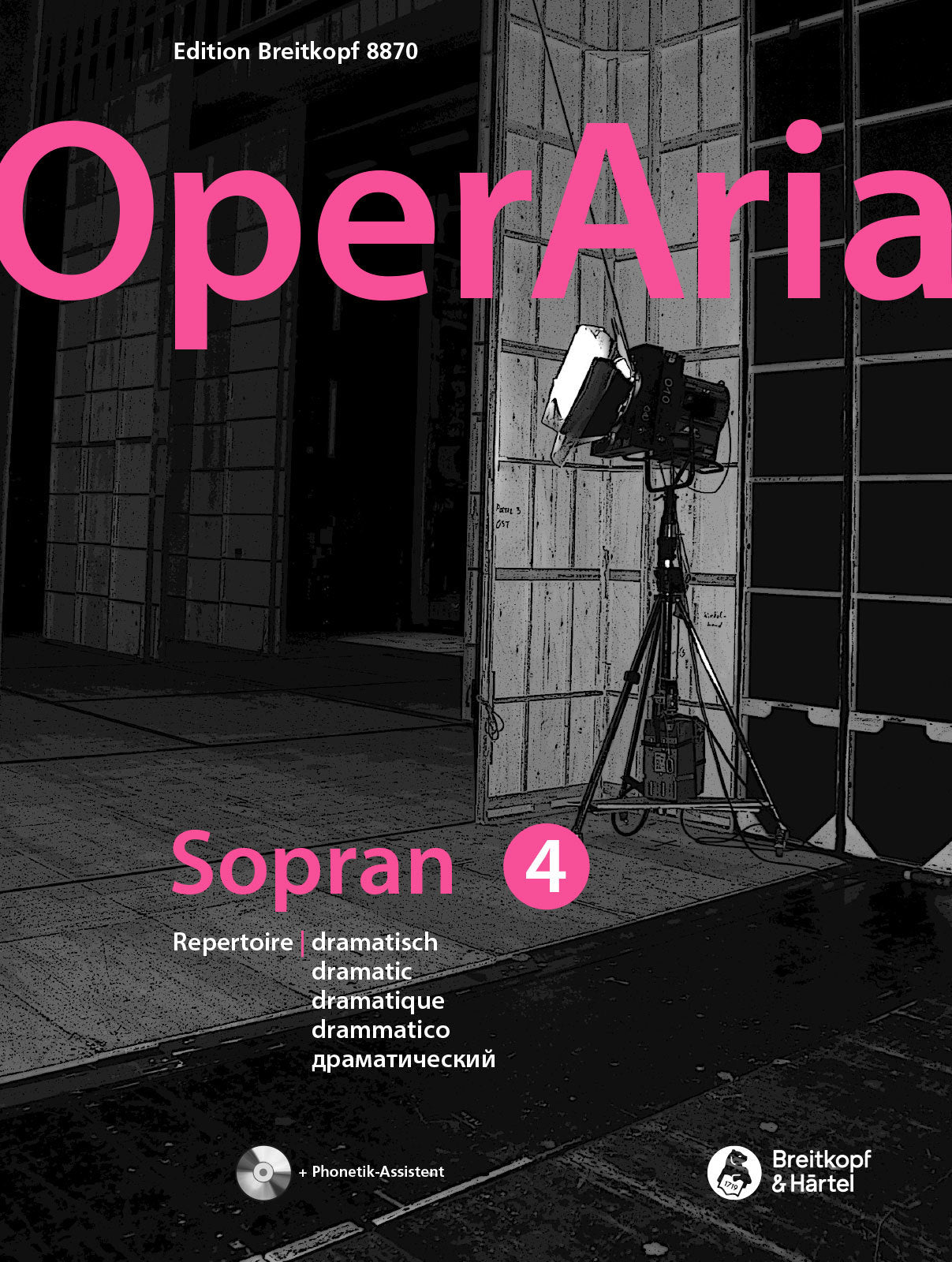OperAria Soprano - Volume 4 - Dramatic
In stock and typically ships within 1 business day.
- Composers: Erich Wolfgang Korngold (1897-1957), Alfredo Catalani (1854-1893), Umberto Giordano (1867-1948), Carl Maria von Weber (1786-1826), Giuseppe Verdi (1813-1901), Ludwig van Beethoven (1770-1827), Richard Wagner (1813-1883), Amilcare Ponchielli (1834-1886), Francesco Cilea (1866-1950), Christoph Willibald Gluck (1714-1787), Jules Massenet (1842-1912), Giacomo Puccini (1858-1924)
- Editors: Peter Anton Ling, Marina Sandel
- Format: Vocal Score
- Instrumentation (this edition): Piano Reduction, Soprano
- Originally for: Opera
- Work Languages: English, French, German, Italian
- ISMN:
- Size: 9.1 x 12.0 inches
- Pages: 156
Listen on Soundcloud
Description
OperAria – repertoire anthology of opera arias according to vocal criteria (range, tessitura, specifics, type of aria) with due regard to practical aspects of musical and theatrical nature (style, era, role type, national provenance). Includes comments on the arias, information on the composer, the librettist, the work, the range and of versions or casting, a short synopsis of the contents illuminating the basic dramatic constellation in the context of the opera's plot, and an evaluation from the singer's point of view.
"Our goal is to give the user a modern-day, systematically structured vocal coach who satisfies the demands of present-day theater practice. At long last a consistent repertoire and a well-ordered conflation of respective audition arias for all vocal genres." (Peter Anton Ling and Marina Sandel, editors)
Works:
- Weber: Und ob die Wolke sie verhülle from Der Freischütz, J. 277, Op. 77
- Wagner: Dich, teure Halle, grüß ich wieder from Tannhäuser, WWV 70
- Wagner: Einsam in trüben Tagen from Lohengrin, WWV 75
- Wagner: Du bist der Lenz from Die Walküre, WWV 86B
- Verdi: Morrò, ma prima in grazia from Un ballo in maschera (A Masked Ball)
- Verdi: Pace, pace, mio Dio from La Forza del Destino
- Verdi: Tu che le vanità conoscesti from Don Carlos
- Verdi: Mi parea / Ave Maria from Otello
- Ponchielli: Suicidio! from La Gioconda
- Massenet: De cet affreux combat / Pleurez mes yeux! from Le Cid
- Catalani: Ebben? Ne andrò lontana from La Wally
- Puccini: Sola, perduta, abbandonata from Manon Lescaut
- Puccini: Vissi d’arte Floria from Tosca
- Puccini: Un bel dì, vedremo from Madama Butterfly
- Cilea: Io son l’umile ancella from Adriana Lecouvreur
- Giordano: La mamma morta from Andrea Chenier
- Korngold: Glück, das mir verblieb from Die tote Stadt, Op. 12
- Gluck: Divinités du Stix from Alceste (French Version), Wq. 44
- Beethoven: Abscheulicher, wo eilst du hin from Fidelio, Op. 72
- Weber: Ozean, du Ungeheuer! from Oberon, J. 306
- Wagner: Traft ihr das Schiff from Der fliegende Holländer (The Flying Dutchman), WWV 63
- Wagner: Hojotoho from Die Walküre, WWV 86B
- Wagner: Mild und leise from Tristan and Isolde, WWV 90
- Verdi: Ritorna vincitor from Aida
Publishers use a lot of words to describe what they sell, and we know it can be confusing. We've tried to be as clear as possible to make sure you get exactly what you are looking for. Below are descriptions of the terms that we use to describe the various formats that music often comes in.
Choral Score
A score for vocalists that only contains the vocal lines. The instrumental parts are not there for reference. Generally, cheaper than a vocal score and requires multiple copies for purchase.
Facsimile
Reproductions of the original hand-written scores from the composer.
Full Score
For ensemble music, this indicates that the edition contains all parts on a single system (there are not separate parts for each player). In larger ensembles, this is for the conductor.
Hardcover
Hardbound. Generally either linen-covered or half-leather.
Orchestral Parts
Similar to a wind set, this is a collection of parts. In the case of strings, the numbers listed are the number of copies included, though generally these are available individually (often with minimum quantities required).
Paperback
When publishers offer multiple bindings (e.g. hardcover) or study scores, this is the "standard" version. If you're planning to play the music, this is probably what you want.
Performance / Playing Score
A score of the music containing all parts on one system, intended for players to share. There are not separate parts for each player.
Set of Parts
For ensemble music, this indicates that there are separate individual parts for each player.
Solo Part with Piano Reduction
For solo pieces with orchestra, this is a version that contains a piano reduction of the orchestra parts. For piano pieces, two copies are typically needed for performance.
Study Score
A small (think choral size) copy of the complete score meant for studying, and not playing. They make great add-ons when learning concertos and small chamber works.
Vocal Score
A score prepared for vocalists that includes the piano/organ part or a reduction of the instrumental parts.
Wind Set
For orchestral music, this is a collection of wind and percussion parts. The specific quantities of each instrument are notated.
With Audio
In addition to the printed music, the edition contains recordings of the pieces. This may be an included CD, or access to files on the internet.
With / Without Fingering (Markings)
Some publishers prepare two copies - a pure Urtext edition that includes no fingering (or bowing) suggestions and a lightly edited version that includes a minimal number of editorial markings.



